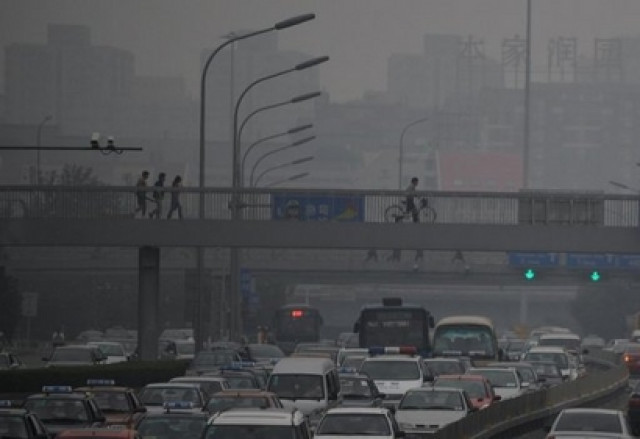Karachi chokes on polluted air with AQI of 244
City's AQI reading crosses 200 for the second time in a week

On Tuesday morning, Karachi's air was downright dirty.
Fog blanketed the city, a haze hung over it, the air was chillier than usual in the winter season and the sun, which would otherwise cause the megalopolis to swelter, no longer seemed as fiery. The weather should have been a relief for Karachiites, but such was not the case. It was not just the weather playing tricks. The city's air was polluted, making it rank third on the United States Air Quality Index (AQI), with an AQI reading of 244.
It was for the third time in a month and twice in a week that Karachi was grouped among cities with the most polluted air, preceded by Delhi and Lahore. In the recent past, it had ranked third on the list with an AQI of 281 on November 13, 2020, and had topped the list with an AQI of 331 on December 2, 2020.
The city again climbed to the third place on Tuesday morning- a rank above from its position the previous night. Meanwhile, New Delhi took the second spot and Lahore topped the list for the worst air quality in the world with 257 and 305 AQI readings, respectively.
Global scales typically rank good air quality between a 0-50 AQI. An AQI over a 100 is termed dangerous for the more vulnerable groups while an AQI past 150 is typically deemed unhealthy and an AQI above 300 is dubbed hazardous.
The correlation
Experts attribute the connection between deteriorating air quality and winters to denser air.
According to them, the air is heavier in the winter as compared to summer, causing poisonous particles in the atmosphere to move downwards and making the atmosphere polluted. As a result, a layer of polluted particles, including large amounts of carbon and smoke, covers the city.
The smoke produced by factories and by burning coal, garbage, oil or tyres enters the atmosphere and the effects of this appear at the onset of winter and remain till the season's end, say experts.
Thus, air pollution reaches extremely dangerous levels, severely compromising air quality.
Although southwestern winds blowing from the sea may work as a filter for the air, these winds remain mostly suspended during winter, according to experts.
They noted that winds blowing from the northeast, visiting the city during winters, increased the concentration of hidden polluted particles, and a healthy atmosphere in such a situation is subject to rainfall, which washes off all polluted particles.
Impact on health
Poor air quality can have detrimental effects on public health and air pollution has been deemed the greatest environmental health risk currently by the World Health Organisation. Typically described as a 'silent killer' given that it is among the top most contributing causes of early death, air pollution can lead to lung tissue damage, cancer, early death and respiratory illnesses such as asthma, bronchitis and emphysema.
In the short term, it can cause difficulty breathing, chest pain, wheezing, coughing, general respiratory discomfort and irritation of the eyes, nose and throat. Of late, doctors and researchers across the world have also pointed towards a correlation between air pollution and deaths in patients whose lungs are weakened by Covid-19.
Published in The Express Tribune, December 9th, 2020.



















COMMENTS
Comments are moderated and generally will be posted if they are on-topic and not abusive.
For more information, please see our Comments FAQ